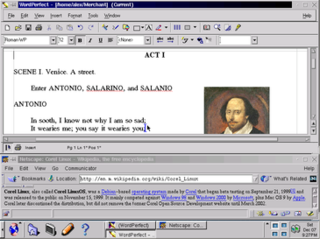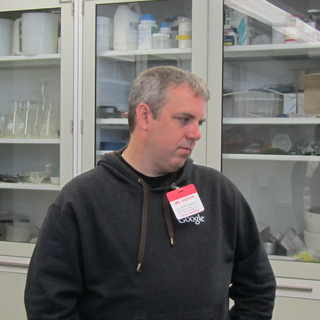Goobuntu was a Linux distribution based on Ubuntu LTS (long-term support). It was used by almost 10,000 Google employees. [1] It added a number of packages for in-house use, including security features and disabled the installation of some applications, but was otherwise similar. Thomas Bushnell, a Google technical leader for the company's Linux desktops, displayed Goobuntu at LinuxCon 2012. Bushnell explained that "Goobuntu is simply a light skin over standard Ubuntu." [2]
Some suggested Google might plan to market the distribution more widely, but Goobuntu was never officially released. [3] [4] [5] While both Google and Mark Shuttleworth, who spearheaded the development of Ubuntu, confirmed the existence of Goobuntu, [6] both denied that Google had any plans to market the operating system. [7]
Mark Shuttleworth confirmed that Google has contributed patches to Ubuntu. [6]
Google used Puppet to manage its installed base of Goobuntu machines. [2]
In 2018, Google replaced Goobuntu with gLinux, a Linux distribution based on Debian Testing. [8]

A Linux distribution is an operating system made from a software collection that includes the Linux kernel and often a package management system. They are often obtained from the website of each distribution, which are available for a wide variety of systems ranging from embedded devices and personal computers to servers and powerful supercomputers.

A light-weight Linux distribution is one that uses lower memory and/or has less processor-speed requirements than a more "feature-rich" Linux distribution. The lower demands on hardware ideally result in a more responsive machine, and/or allow devices with fewer system resources to be used productively. The lower memory and/or processor-speed requirements are achieved by avoiding software bloat, i.e. by leaving out features that are perceived to have little or no practical use or advantage, or for which there is no or low demand.

Mark Richard Shuttleworth is a South African and British entrepreneur who is the founder and CEO of Canonical, the company behind the development of the Linux-based Ubuntu operating system. In 2002, Shuttleworth became the first South African to travel to space, doing so as a space tourist. He lives on the Isle of Man and holds dual citizenship from South Africa and the United Kingdom. According to the Sunday Times Rich List in 2020, Shuttleworth is worth an estimated £500 million.

Ubuntu is a Linux distribution derived from Debian and composed mostly of free and open-source software. Ubuntu is officially released in multiple editions: Desktop, Server, and Core for Internet of things devices and robots. The operating system is developed by the British company Canonical and a community of other developers, under a meritocratic governance model. As of April 2024, the most-recent long-term support release is 24.04.

Canonical Ltd. is a privately held computer software company based in London, England. It was founded and funded by South African entrepreneur Mark Shuttleworth to market commercial support and related services for Ubuntu and related projects. Canonical employs staff in more than 70 countries and maintains offices in London, Austin, Boston, Shanghai, Beijing, Taipei, Tokyo and the Isle of Man.

Corel Linux, also called Corel LinuxOS, was a Debian-based operating system made by Corel that began beta testing on September 21, 1999 and was released to the public on November 15, 1999. It mainly competed against Windows 98 and Windows 2000 by Microsoft, plus Mac OS 9 by Apple. Corel later discontinued the distribution, but did not remove the former Corel Open Source Development website until March 2002.

Kubuntu is an official flavor of the Ubuntu operating system that uses the KDE Plasma Desktop instead of the GNOME desktop environment. As part of the Ubuntu project, Kubuntu uses the same underlying systems. Kubuntu shares the same repositories as Ubuntu and is released regularly on the same schedule as Ubuntu.
AppImage is an open-source format for distributing portable software on Linux. It aims to allow the installation of binary software independently of specific Linux distributions, a concept often referred to as upstream packaging. As a result, one AppImage can be installed and run across Ubuntu, Arch Linux, and Red Hat Enterprise Linux without needing to use different files. It aims to be a format that is self-contained, rootless, and independent of the underlying Linux distribution.

Thomas Bushnell, formerly known as Michael Bushnell, is a software developer and Gregorian friar. He was the founder and principal architect of GNU's official kernel project, the GNU Hurd. Bushnell was Hurd's official maintainer from its instigation until November 2003. Bushnell was previously a Debian developer, and was employed by Google LLC from July 2010 until the January 2024 layoffs. He is a member of Saint Mark's Episcopal Church in Glendale, California.
Upstart is a discontinued event-based replacement for the traditional init daemon—the method by which several Unix-like computer operating systems perform tasks when the computer is started. It was written by Scott James Remnant, a former employee of Canonical Ltd. In 2014, Upstart was placed in maintenance mode, and other init daemons, such as systemd, were recommended in place of Upstart. Ubuntu moved away from Upstart with the release of version 15.04 in favor of migrating to systemd. As of June 2024, there have been no updates released for Upstart since September 2014.
The DCC Alliance (DCCA) was an industry association designed to promote a common subset of the Debian Linux operating system that multiple companies within the consortium could distribute. It was founded by Ian Murdock in 2005 and was wound up in 2007.

Peppermint OS is a Linux distribution based on Debian and Devuan Stable, and formerly based on Ubuntu. It uses the Xfce desktop environment. It aims to provide a familiar environment for newcomers to Linux, which requires relatively low hardware resources to run.

Linspire is a commercial operating system based on Debian and Ubuntu and currently owned by PC/OpenSystems LLC. It had been owned by Linspire. Inc. from 2001 to 2008, and then by Xandros from 2008 to 2017.

Ubuntu Kylin is the official Chinese version of the Ubuntu computer operating system. It is intended for desktop and laptop computers, and has been described as a "loose continuation of the Chinese Kylin OS". In 2013, Canonical Ltd. reached an agreement with the Ministry of Industry and Information Technology to co-create and release an Ubuntu-based operating system with features targeted at the Chinese market.
Besides the Linux distributions designed for general-purpose use on desktops and servers, distributions may be specialized for different purposes including computer architecture support, embedded systems, stability, security, localization to a specific region or language, targeting of specific user groups, support for real-time applications, or commitment to a given desktop environment. Furthermore, some distributions deliberately include only free software. As of 2015, over four hundred Linux distributions are actively developed, with about a dozen distributions being most popular for general-purpose use.
Ubuntu is a Debian-based Linux distribution for personal computers, tablets and smartphones, where the Ubuntu Touch edition is used; and also runs network servers, usually with the Ubuntu Server edition, either on physical or virtual servers or with containers, that is with enterprise-class features.
gLinux is a Debian Testing-based Linux distribution used at Google as a workstation operating system. The Google gLinux team builds the system from source code, introducing their own changes. gLinux replaced the previously used Ubuntu-based distribution, Goobuntu. gLinux is usually installed by loading into a bootstrap environment when it is first booted up. When it is started, the root files are unpacked and the Debian installer starts to perform the installation. According to a former user of the OS, it uses the Cinnamon desktop environment. As of 2024, only the GNOME desktop environment is fully supported. Over the years, Google has focused on speed, scale and data, which is the thought process that allowed them to move to gLinux. Google used Ubuntu before switching to gLinux; however, the two years of security updates it provided meant that planning for the next upgrade would take close to a year.